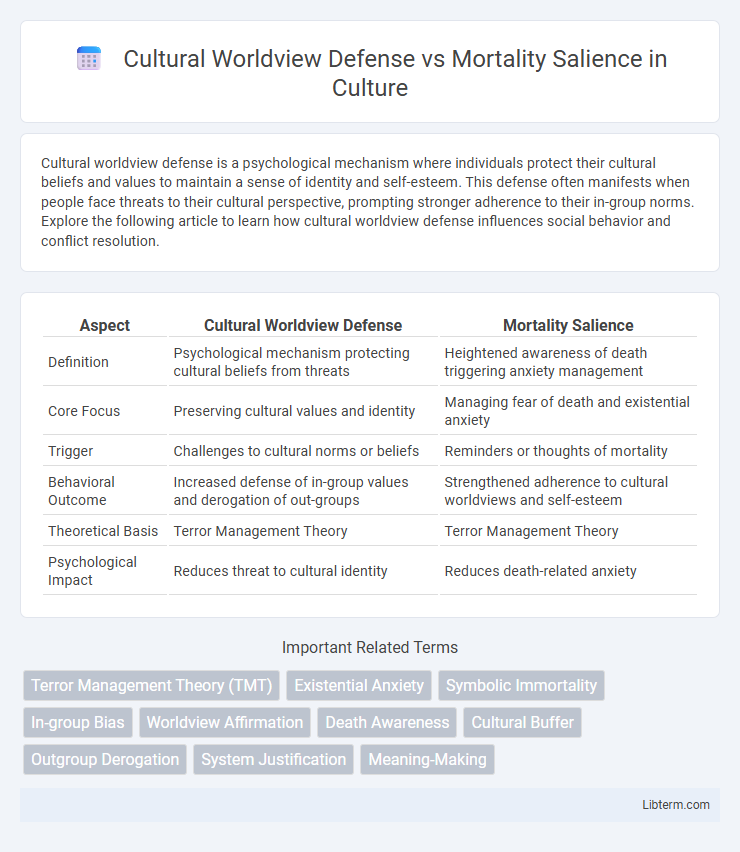Cultural worldview defense is a psychological mechanism where individuals protect their cultural beliefs and values to maintain a sense of identity and self-esteem. This defense often manifests when people face threats to their cultural perspective, prompting stronger adherence to their in-group norms. Explore the following article to learn how cultural worldview defense influences social behavior and conflict resolution.
Table of Comparison
| Aspect | Cultural Worldview Defense | Mortality Salience |
|---|---|---|
| Definition | Psychological mechanism protecting cultural beliefs from threats | Heightened awareness of death triggering anxiety management |
| Core Focus | Preserving cultural values and identity | Managing fear of death and existential anxiety |
| Trigger | Challenges to cultural norms or beliefs | Reminders or thoughts of mortality |
| Behavioral Outcome | Increased defense of in-group values and derogation of out-groups | Strengthened adherence to cultural worldviews and self-esteem |
| Theoretical Basis | Terror Management Theory | Terror Management Theory |
| Psychological Impact | Reduces threat to cultural identity | Reduces death-related anxiety |
Understanding Cultural Worldview Defense
Cultural Worldview Defense refers to the psychological mechanism where individuals bolster their cultural beliefs and values when confronted with perceived threats, helping to maintain self-esteem and social cohesion. This defense becomes particularly pronounced under Mortality Salience, the awareness of one's own death, which intensifies the need to uphold cultural norms and reject divergent worldviews. Understanding this process reveals how existential anxiety drives people to cling to shared cultural identities to achieve psychological security.
Defining Mortality Salience
Mortality salience refers to the heightened awareness of one's own death, which triggers existential anxiety and motivates individuals to cling more strongly to their cultural worldviews. This psychological defense mechanism helps reduce death-related anxiety by reinforcing beliefs, values, and norms that provide meaning and stability. Studies show that increased mortality salience strengthens in-group cohesion and amplifies resistance to cultural threats, supporting the cultural worldview defense hypothesis.
Theoretical Framework: Terror Management Theory
Terror Management Theory posits that cultural worldview defense mechanisms activate when individuals face mortality salience, or the awareness of their own death. This theoretical framework suggests that reminders of mortality intensify adherence to cultural beliefs and values, serving as a psychological buffer against existential anxiety. Empirical studies demonstrate that heightened mortality salience leads to increased defense of cultural worldviews, reinforcing identity and reducing death-related fear.
Origins of Cultural Worldview Defense
Cultural worldview defense originates from the need to manage existential anxiety triggered by awareness of mortality, with roots in terror management theory developed by social psychologists Greenberg, Solomon, and Pyszczynski in the 1980s. This defense mechanism activates when mortality salience--conscious recognition of death--challenges deeply held cultural beliefs, prompting individuals to reinforce their cultural worldviews to restore psychological security. Empirical studies demonstrate that reminders of death increase efforts to uphold cultural norms, highlighting the interconnectedness of mortality salience and cultural worldview defense in maintaining self-esteem and meaning.
Psychological Impact of Mortality Salience
Mortality salience triggers heightened anxiety, leading individuals to cling more strongly to their cultural worldviews as a psychological defense mechanism. This process reduces existential fear by reinforcing group identity and shared beliefs, which buffer against the terror of mortality awareness. Experimental evidence shows increased in-group favoritism and out-group derogation following mortality salience stimuli, highlighting its profound impact on social cognition and behavior.
How Mortality Salience Triggers Worldview Defense
Mortality salience triggers cultural worldview defense by heightening awareness of death anxiety, prompting individuals to cling more strongly to their cultural beliefs and values as a psychological buffer. This response serves to reinforce self-esteem and provide existential meaning, reducing the terror associated with mortality reminders. Experimental studies demonstrate that exposure to death-related stimuli increases adherence to in-group norms and derogation of out-group members, thereby strengthening worldview defense mechanisms.
Cross-Cultural Perspectives on Mortality Awareness
Cross-cultural perspectives on mortality awareness reveal variations in how cultural worldview defense mechanisms activate in response to mortality salience, influencing social behavior and personal identity differently across societies. Studies indicate that collectivist cultures often emphasize group cohesion and relational values when confronted with death reminders, while individualistic cultures prioritize self-esteem and personal achievements as defense strategies. These distinctions underscore the role of cultural frameworks in shaping psychological responses to the awareness of mortality and highlight the importance of context-specific approaches in terror management theory research.
Experimental Studies on Worldview Defense and Death Reminders
Experimental studies on cultural worldview defense often utilize mortality salience manipulations to investigate how reminders of death influence individuals' adherence to their cultural beliefs. These experiments demonstrate that when participants are exposed to death reminders, they exhibit increased defense of their cultural values, such as endorsing in-group favoritism and derogating out-groups. Research consistently links mortality salience with heightened worldview defense, confirming terror management theory's assertion that cultural beliefs buffer death anxiety.
Implications for Intergroup Relations and Prejudice
Cultural worldview defense heightens in response to mortality salience, leading individuals to bolster their own cultural values and norms as a psychological buffer against death anxiety. This dynamic often exacerbates intergroup tensions, as heightened defense mechanisms amplify favoritism toward in-groups while intensifying prejudice and hostility toward out-groups. Understanding these effects is critical for developing interventions aimed at reducing intergroup conflict and promoting social cohesion in diverse societies.
Strategies for Reducing Defensive Reactions to Mortality Salience
Strategies for reducing defensive reactions to mortality salience include promoting cultural worldviews that emphasize inclusivity and shared human values, which can mitigate the need for rigid defense mechanisms. Techniques such as mindfulness, perspective-taking, and existential therapy encourage individuals to accept mortality without heightened anxiety, reducing the reliance on cultural worldview defense. Empirical research demonstrates that increasing tolerance for ambiguity and fostering secure social connections also diminish defensive responses triggered by reminders of death.
Cultural Worldview Defense Infographic

 libterm.com
libterm.com